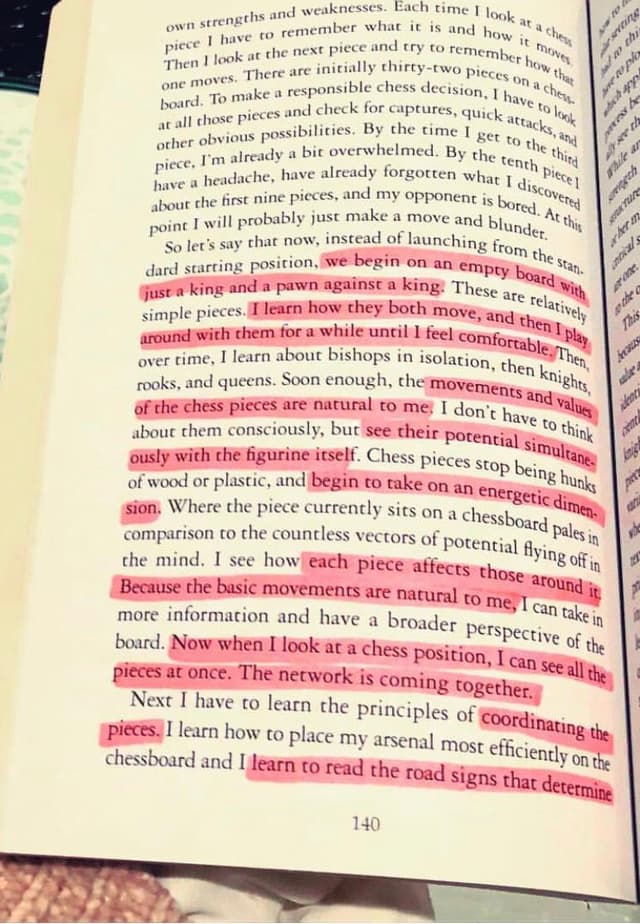🧵 View Thread
🧵 Thread (18 tweets)

A cool thing about practicing music is that there are at least two primary vectors you can get better at: you can improve your sense of melody, or your sense of rhythm. It’s like two separate but intertwined skill trees and you develop your unique style through your unique config

Re: melody, you can either try to write, play, mimic and remix interesting melodies, or you can just randomly (or pointedly) explore the melodic landscape by dicking around purposefully on the keys/strings to find interesting patterns and relationships

Re: rhythm - I’ve been getting a lot of value by slowing things down, which creates a lot more space for you to consider the value of each specific beat, and the relationships between beats. It’s like zooming in to find richness and nuance. You could also try alternate rhythms

In both cases you don’t even need a musical instrument to play around. You can use your hands and feet to tap out rhythms, you can use your mouth/nose to hum, sing & whistle melodies. A musician with good project management can learn to be never bored, always chewing on something

Yes! And a fourth might be “playing well with others”. Getting better and making improvements on any one of these vectors opens up new options and territories on the other trees. The joy of music is in dancing across and synthesizing all of these worlds https://t.co/3fBBowR9u5

Following so far? Now... music is a metaphor for literally everything. For ideas, for language, for relationships. Everything is musical. Music is one of my favourite metaphors because the goal is often to play beautifully more so than to win a specific type of game

(Could enter some gooey-wooey territory with “music is vibrations, everything is vibrations” but I’m not feeling *that* wooey today. I’m more curious about the project management of developing musicality, first in music but also in all other pursuits and ways of being.) https://t.co/xqpGb6EmBq

When I started out as a musician, I had some persistent issues 1. I played too fast 2. Used too many notes 3. Would easily go out of tune 4. Poor sense of rhythm 5. Was bad at listening to others and supporting them well Surprise!! These were all also problems outside of music

I used to try to play music to assert myself. Now I realise that it’s much more fun and interesting to play to explore and discover - and in the process your identity comes through so much better. It’s one of many important things in life that are like this https://t.co/64nbLxSAON

An interesting thing to discover - Paul Gilbert had a short little clinic about this - many musicians try to play louder and faster to be heard, but actually it’s better to play “in the pocket”, “on/with the beat” - to seek resonance with what already is. https://t.co/f8yJZ9uPg7

A common false dichotomy in a lot of contexts is “is it better to stand out or fit in?” You can actually do both well, or either terribly. It depends on your sensitivity to the context. Most things worth talking about are complex enough to allow for beautiful differences https://t.co/Y9aXwRtKTU

I’m actually not a great musician and I never will be. I’ll always just be kinda decent. But learning and playing music was certainly an instrumental catalyst that propelled and continued to propel me towards my goal of being a great writer and communicator https://t.co/CVNLOL0jqg

So I spent about a decade playing with the language of music - at some point in my life I’m definitely going to devote about a decade to visual art, a decade to food, a decade to a third language... each of these, universe willing, will become an entire cylinder in my mind-engine https://t.co/UweyQ6Lpj8

This morning I’m thinking about - “learning how to learn” - the project management of teaching - the game of observing patterns - how big things are made up of little things - how Nepali language teachers inspired an economist professor - how Megaman X teaches you to play it

Frank found 13 weeks of mimicking children to be a superior way of learning a new language vs 4 years of learning Spanish in school https://t.co/BlxioGHUd1

This radical contrast informed his economic pedagogy. Learning economics is like learning a language; it’s important to start slowly and see each idea in multiple contexts. “If you find this way of learning superior, tip your hat to my Nepali language Instructors.”

I’ve rewatched this video about Megaman X’s genius design many, many times... and I’m going to watch it again now, and break it down https://t.co/U07EvUlM2U

^ Done. What a great game and what a fantastic example of thoughtful, empathetic design https://t.co/AVaxTn0cBA

Egoraptor opens by explaining how early video games didn't really know how to how to teach & engross players. They made poor simulations of real-world games, like sports or cards. They would often use tedious instruction manuals on how to play, or distracting in-game tutorials https://t.co/kWVIzrbSJw


Start small, understand behaviors, understand relationships https://t.co/QIxiIGiuZ0
